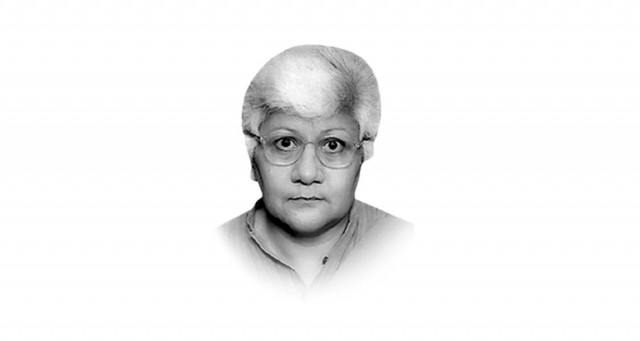Anti-Americanism does not equal anti-imperialism
Many in the left tend to associate anti-imperialism with religious resurgence and maintain their distance from it.

Raymond Davis seems to have become a symbol of the struggle between a liberal lobby that supports a pragmatic view of politics and argues that a poor country like Pakistan cannot afford the luxury of national honour, and those who believe that it is better to die for religion and nation than to feed ravenously upon contemptuously thrown imperial morsels. The problem with such a dichotomous discourse is that it conflates anti-imperialism with anti-Americanism, even though the two are extremely dissimilar discourses with only a few overlaps.
Pakistan, as a country, has been rebuked for its seeming anti-Americanism, which appears to be closely tied to the rise of religious extremism. Religious parties and groups have been in the forefront of rallies against Davis, demanding the prevention of his repatriation by a government caught between the devil and the deep blue sea. With religious parties increasingly claiming anti-American space as their exclusive preserve, the liberals have been pushed into a position of supporting or, at the very least, condoning American actions such as drone attacks.
The liberal dilemma arises from the fact that a clear distinction between anti-Americanism and anti-imperialism has not been made. Many in the left also tend to associate anti-imperialism with religious resurgence and maintain their distance from it. It is time to clarify some of the visible differences between these two ways of thinking.
The following are some of the characteristics of anti-Americanism: 1) It is an emotional reaction based on the rage against foreign intervention and domination; 2) It is premised on an imagined homogenisation of ‘America’; 3) It is country-specific and reduces imperialism to one country; 4) It reduces imperialism purely to cultural domination; 5) It fails to provide an economic analysis of imperialism. The following are some of the key elements of anti-imperialism: 1) It is based on a rational analysis of global capitalism; 2) It regards imperialism as global rather than specific to a country; 3) It differentiates between competing social classes within a country instead of homogenising the country; 4) It regards cultural domination as a part of the superstructure of imperialism with economic and military domination as the base; 5) The opposition to the globalisation of capital is based on class rather than religious solidarity across states.
The anti-Americanism of the religious right is thus faulty on several grounds. It evokes raw passions and base emotions, rather than a detached and rational analysis of the relations between states and social classes within states. It denounces American unilateralism and interventionism based on the primitive notion of honour, rather than locating it within a capitalist ethos of hyper-militarisation fuelled by the massive profits of the armament industry. Religious anti-Americanism homogenises ‘America’, disregarding the vast diversity of peoples, cultures, beliefs, perspectives and social differentiation. Instead of criticising the capitalist alliance between the arms industry, the government, state department, secret agencies and the Pentagon, emotional anti-Americanism is critical of all Americans, irrespective of the fact that many are poor working class people, rights activists, anti-war protesters, entertainers and academics critical of government interventionism. The response of the religious right to imperialism is often limited to cultural invasion, with little focus on an economic understanding based on the analysis of the system of production, circulation and distribution of capital and the realisation of profits. Most importantly, religious resistance to American hegemony fails to see imperialism historically with the result that earlier imperialisms, such as Arab imperialism in the subcontinent, is never mentioned. The country-specific view makes it appear as though imperialism has a single location.
In contrast, the critique of imperialism by the left was based on a detailed analysis of the globalisation of capital and the mutual competition among advanced economies over colonies, raw materials and markets. The division of the world into spheres of influence through a strategy of permanent war was believed to be the corollary of the global and mobile nature of capital. Imperialism was seen as global with competing imperialisms making it a far more complex phenomenon than one located in a singular location. The socialist critique is based on the idea that the contradiction and conflict between social classes exists within as well as across countries. States are not monolithic entities but represent the rule of some classes over others, with the result that conflict among classes aspiring to ascendancy is perpetual. Democracy represented the rise of the bourgeoisie against the nobility, while the welfare state was the outcome of a historical compromise between capital and labour. Conflict is thus a driver of change, a motor of history. Contemporary neo-imperialism is seen as the rise of the ideologies of privatisation, liberalisation and deregulation promoted assiduously by the IMF, World Bank and the WTO, which are seen as the engines of modern capitalism. The domination of multinational companies, which have made states adjuncts to their drive for profit maximisation, is seen as the main feature of latter day imperialism.
The religious right has been comfortable with capitalism, private profit and corporate greed. It was also at ease with the Ronald Reagan era conflict between competing Soviet and US imperialisms, and supported the latter when it was ostensibly liberating Islam from communism. The left must be wary of yielding the space of anti-imperialism to the religious right. Anti-Americanism is a phenomenon quite different from a reasoned critique of imperialism.
Published in The Express Tribune, March 17th, 2011.













COMMENTS
Comments are moderated and generally will be posted if they are on-topic and not abusive.
For more information, please see our Comments FAQ